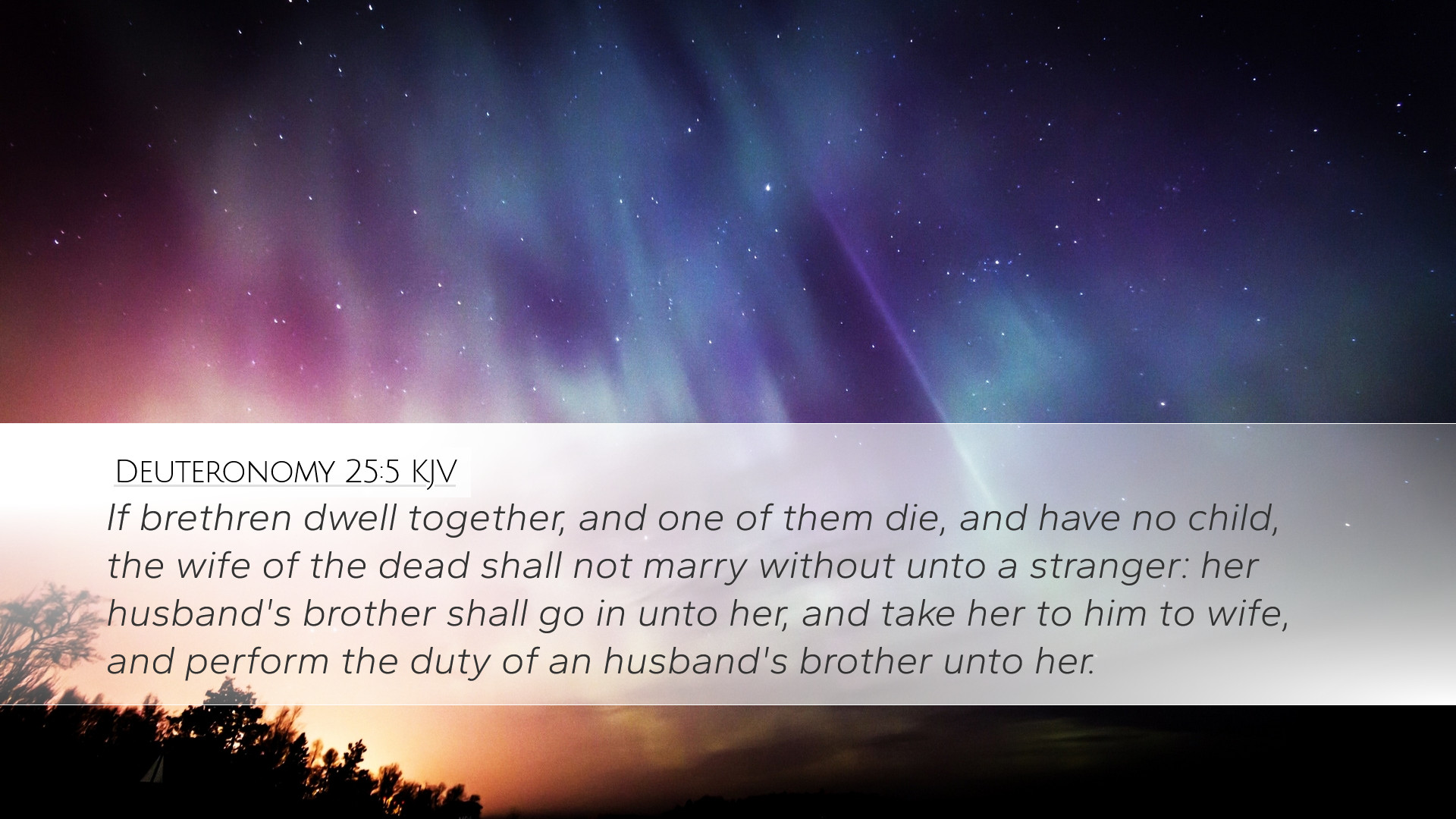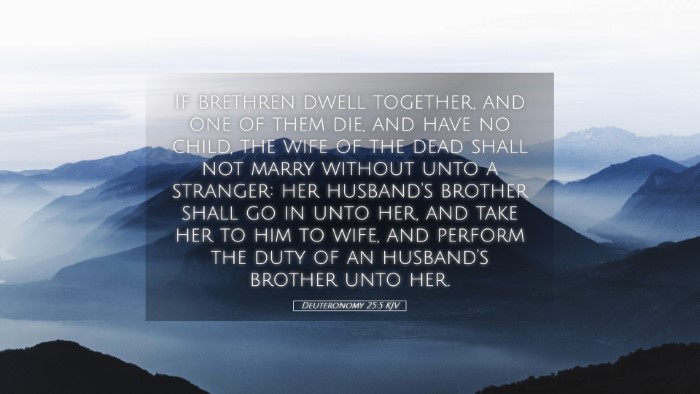Commentary on Deuteronomy 25:5
Verse Context: Deuteronomy 25:5 states, "If brothers dwell together, and one of them dies and has no son, the wife of the dead man shall not be married outside the family to a stranger. Her husband's brother shall go in to her and take her as his wife and perform the duty of a brother-in-law to her."
Introduction
The passage in Deuteronomy 25:5 addresses the concept known as "levirate marriage", a significant legal and cultural practice in ancient Israelite society. This custom serves to preserve family lineage and ensure the welfare of widowed women. Understanding this verse requires an analysis of its historical, social, and theological implications, particularly how it aligns with God’s covenantal purpose for the Israelites.
Historical and Cultural Background
In ancient Israel, family and heritage held immense importance. The Israelites believed a man's lineage was perpetuated through his sons. In the absence of heirs, the brother of a deceased man was compelled to marry the widow to produce offspring who would bear the deceased's name and inherit his property. This practice aimed to prevent the loss of family heritage and ensure that the name of the deceased lived on within the community.
Social Implications
This law also served to protect vulnerable women in society. By mandating that a brother marry his deceased brother's widow, it ensured her economic security and protection in a patriarchal society where women often had limited rights and opportunities. Such practices reflect God's concern for social justice and the dignity of individuals.
Theological Dimensions
Theologically, this passage embodies God’s covenantal faithfulness to His people. The practice symbolizes the love and duty inherent in familial relationships, mirroring God's relationship with Israel. The concept of responsibility towards one's kin resonates throughout the Scriptures, illustrating the broader principle of community and fellowship among God’s people.
Matthew Henry's Insights
Matthew Henry emphasizes the moral obligation to care for one's family. He notes that the levirate law is not merely a legal stipulation but embodies the broader principle of love and familial duty. Henry highlights the importance of understanding our responsibilities toward one another in the context of the biblical community, suggesting that this law is reflective of God's care for His creation.
Albert Barnes' Commentary
Albert Barnes provides a thorough examination of the levirate marriage concept, arguing its significance in preserving family rights and property. He underscores that this practice serves as a safeguard against the alienation of family wealth and provides a framework to ensure that relationships and inheritances remain intact. Barnes articulates that the cultural customs of that time, while foreign to modern readers, contain timeless principles of commitment and protection for the vulnerable.
Adam Clarke's Perspective
Adam Clarke offers a detailed analysis of the practical aspects of this law. He notes that the term “levir” derives from the Latin for brother-in-law and emphasizes the legal and social obligations that arise from such relationships. Clarke points out that this commandment not only addresses individual responsibilities but also reflects God's overarching intention for a cohesive and supportive community, fostering relationships that honor and uphold the family structure.
Application for Contemporary Readers
For pastors, theologians, and students alike, Deuteronomy 25:5 serves as a reminder of the interconnectedness of relationships within the body of Christ. The implications of this passage transcend mere legalism; they invite reflection on our responsibilities toward one another, especially in caring for the vulnerable among us. It encourages the faithful to embody the principles of love, responsibility, and community support as modeled by the law given to Israel.
Encouragement in Ministry
In pastoral ministry, this verse can inspire teachings on commitment, care, and community involvement. By exploring how God’s mandates shape interpersonal relationships, pastors can guide congregations toward a deeper understanding of community dynamics, emphasizing the importance of looking out for one another, particularly for those who are widowed or in need of support.
Theological Reflection
The theological implications provide a fertile ground for reflection on God’s redemptive purposes. The narrative of redemption found in Christ parallels the restoration intended in the practice of levirate marriage, calling for a deeper communion with God that leads to love and care for each other.
Conclusion
Deuteronomy 25:5 is a profound reflection on the nature of community, obligation, and God's covenant. By studying this verse through the lens of historical context and theological significance provided by noted commentators, we glean vital lessons applicable to contemporary life. The call to mutual support, protection, and love remains as relevant today as it was in ancient Israel. As we contemplate these truths, may we strive to live out the principles of care and commitment that honor the call of God in our lives.


